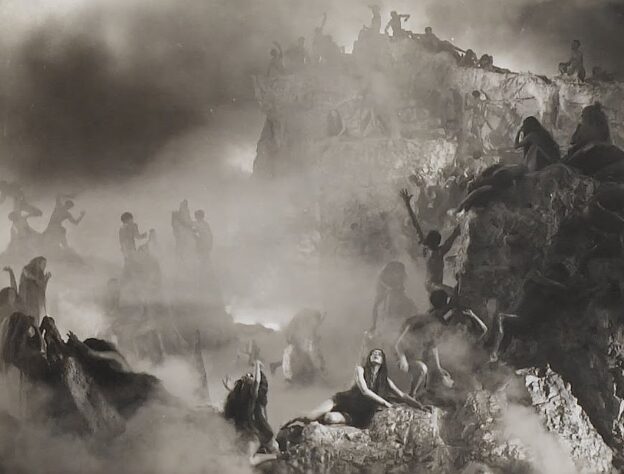Virgil, Dante’s guide through Hell and Purgatory, represents natural reason, classical virtue, and the limits of human understanding. This article explores Virgil as a symbol of philosophical clarity, moral insight, and noble limitation, showing how Dante honours reason, even as he insists on the necessity of grace.
Introduction: The Guide from Another World
In The Divine Comedy, Dante the pilgrim is not left to face the infernal abyss alone. His guide is Virgil, the Roman poet of The Aeneid, who steps forth in Inferno I as a beacon of wisdom, clarity, and composure. At first glance, Virgil appears to be a literary gesture, a respectful invocation of classical authority. But within the theological framework of the Commedia, he is far more: the personification of human reason, the embodiment of natural virtue, and the figure who leads the soul to the threshold of grace, but no further.
Virgil represents what man, unaided by revelation, can know: justice, order, moderation, and the pursuit of honour. His presence affirms Dante’s debt to antiquity and Romanitas. But his eventual departure also affirms the Christian view that reason, while noble, is not salvific.
Virgil as Natural Reason: The Limits of Philosophy
Dante draws heavily on Thomistic thought, which places reason as the highest faculty of the human soul, but still one in need of grace. Virgil embodies the virtus moralis of the ancients: he understands vice and virtue, can explain justice and temperance, and can guide Dante through the recognition of sin and the purification of the will.
Yet he cannot ascend to Heaven, nor bring Dante there. This is not a fault of Virgil’s character, but of his historical and spiritual condition. He lived before the Incarnation and thus stands as the noblest pagan, full of insight, but barred from beatitude. His presence affirms that truths may be known without faith, but not the fullness of salvation.
In Inferno IV, we find Virgil among the virtuous non-Christians of Limbo: Homer, Horace, Socrates, and Saladin. They are not tormented, but they are incomplete, living in the light of reason without the warmth of grace.
The Poet as Prophet: Virgil’s Roman Authority
Virgil’s Aeneid was more than literature; it was a foundational myth of Rome and its imperial mission. Dante, too, believes in Rome’s divine role, as articulated in De Monarchia. That Virgil serves as Dante’s guide affirms a deeper idea: that Rome, even in its pagan form, was a providential preparation for Christendom.
Indeed, medieval interpreters read Virgil’s Fourth Eclogue, which speaks of the birth of a divine child, as a pagan prophecy of Christ. Dante makes use of this interpretation, crafting Virgil as not only a moral guide but a prefigurative witness, one who unknowingly gestures toward truths he cannot fully grasp.
He is, in this sense, both poet and prophet, a John the Baptist of the intellect.
Virgil and the Inferno: Logic in the Face of Horror
Throughout Inferno, Virgil provides calm exposition, interprets the structure of Hell, and rebukes the demons with composure and command. He is a moral mapmaker in a chaotic world. Where Dante the pilgrim faints or weeps, Virgil remains composed.
Yet Virgil is not unfeeling. In Inferno XX, when they encounter the weeping soothsayers whose heads are twisted backwards, Virgil himself weeps. Dante is chastised for his pity, but Virgil’s tears reflect compassion tempered by understanding. He is not indifferent, but clear-eyed. He feels, but does not lose orientation.
This emotional restraint, this disciplined compassion, is at the heart of his function as reason; it is not coldness, but clarity. Where Beatrice burns with divine light, Virgil illuminates by steady flame.
Virgil’s Limit and Departure: Where Reason Cannot Follow
In Purgatorio XXVII–XXX, Virgil’s role ends. He guides Dante to the Earthly Paradise, the summit of Mount Purgatory, but no further. He cannot ascend to Heaven, nor can he interpret the divine mysteries that await.
His parting words, “No longer await word or sign from me. Free, upright and whole is your will”, mark the moment when reason has done all it can. It has restored the moral will and prepared the soul for grace. It has brought the pilgrim from fear to freedom.
There is deep poignancy in his departure. Dante the pilgrim weeps, and the reader feels the loss. But this is part of the Christian metaphysics of the Comedy: reason bows to revelation. The guide must disappear so the vision can emerge.
The Virtuous Pagan: Neither Damned Nor Saved
Virgil’s placement in Limbo raises important theological questions. He is not damned in the fiery sense, but he is excluded from the Beatific Vision. For Dante, liminality becomes his fate: eternally worthy, yet eternally outside.
But this also makes Virgil the most honoured figure outside salvation. He is a rebuke to narrow religious triumphalism, a reminder that truth and virtue exist beyond the Church, and that classical antiquity, while incomplete, is not to be despised.
Virgil is the bridge from antiquity to Christendom, from civic virtue to divine love.
Conclusion: The Guide We Must Leave Behind
Virgil is the greatest gift of the classical world: the disciplined mind, the poetic voice, the moral compass. In Dante’s vision, he leads the soul as far as nature and reason allow. He maps Hell with precision, explains the steps of penance, and frees the will from disorder.
But salvation requires more. It requires Beatrice, wisdom, grace, and revealed truth.
Yet the soul never forgets its first guide. Virgil, like the Aeneid he wrote, prepares the way for something greater. He cannot enter the light, but he shows us how to walk through the dark.
